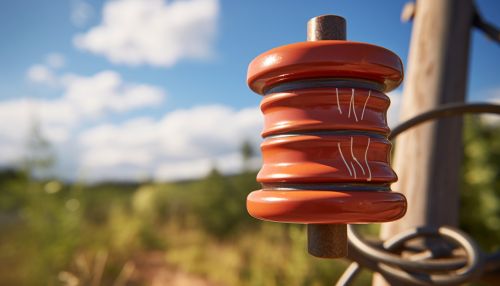Insulator (electricity)
Introduction
An insulator in the context of electricity is a material that resists the flow of electric current. Insulators are used to protect equipment and life from electric shocks and to support and separate electrical conductors without allowing current through themselves. An insulating material used in bulk to wrap electrical cables or other equipment is called insulation.
Properties of Insulators
The effectiveness of an insulator is determined by its dielectric constant and its dielectric strength. An insulator with a high dielectric constant will be better at reducing the flow of electricity than an insulator with a low dielectric constant. The dielectric strength, on the other hand, is the maximum electric field that a pure material can withstand under ideal conditions without breaking down (i.e., without experiencing failure of its insulating properties).


Types of Insulators
There are several types of insulators used in the electrical industry. Some of the most common types include:
- Ceramic insulators: These are made from clay, quartz or alumina and feldspar, and are covered with a smooth glaze to shed water. Ceramics have a very high dielectric strength, making them suitable for high-voltage applications.
- Glass insulators: These are made from silica, and are highly resistant to heat, making them suitable for use in environments with high temperatures.
- Plastic insulators: These are made from polymers like PVC, polyethylene, and polypropylene. Plastics are flexible and resistant to moisture and chemicals, making them suitable for a wide range of applications.
- Rubber insulators: These are made from natural or synthetic rubber and are used for their flexibility and moisture resistance.
Applications of Insulators
Insulators are used in a wide variety of applications, including:
- Power lines: Insulators are used to prevent the flow of electricity from power lines into the earth or other structures.
- Electrical appliances: Insulators are used in the wiring and components of electrical appliances to prevent electric shocks.
- Circuit boards: Insulators are used to separate the various components on a circuit board and prevent short circuits.
See Also
Categories
Note: This is a simplified version of the article. For more expert-level information, please refer to the original article.
